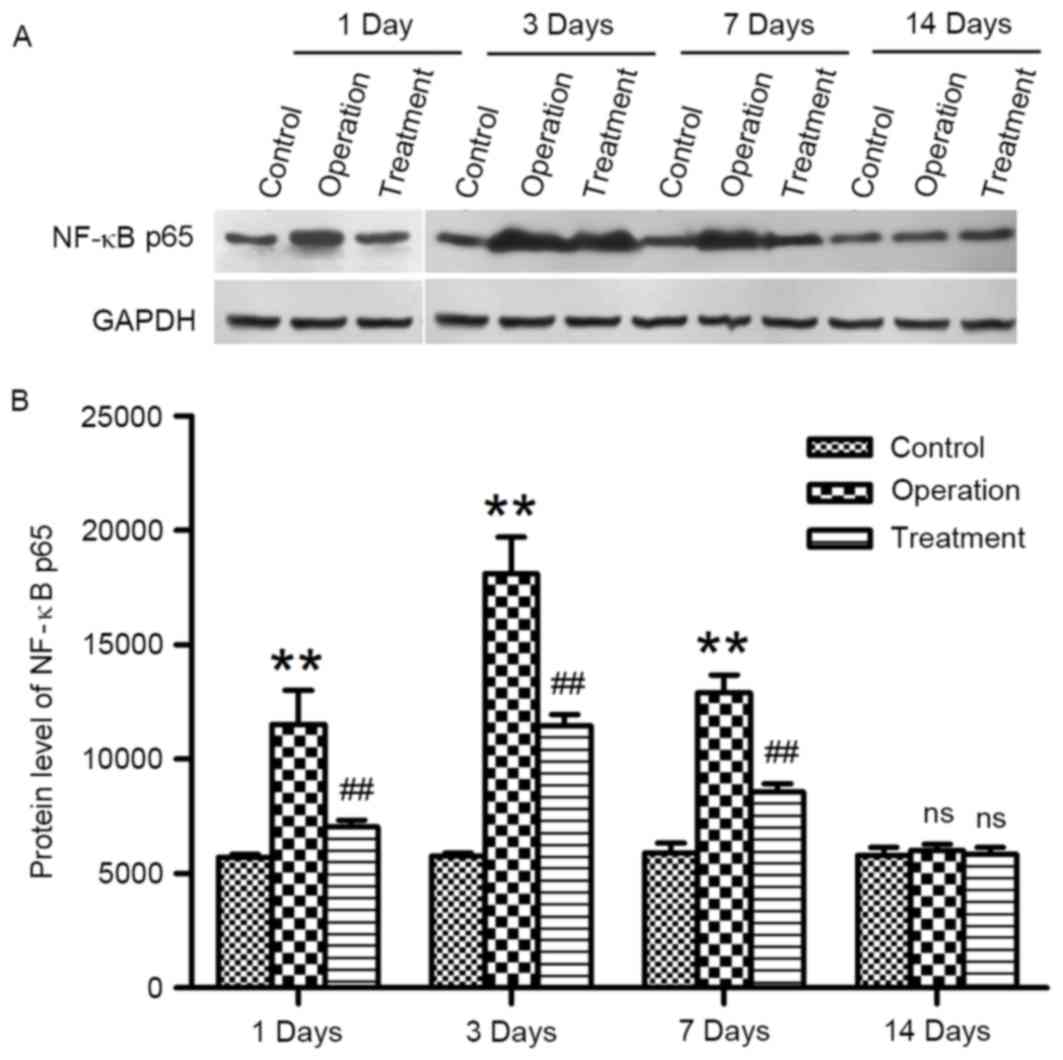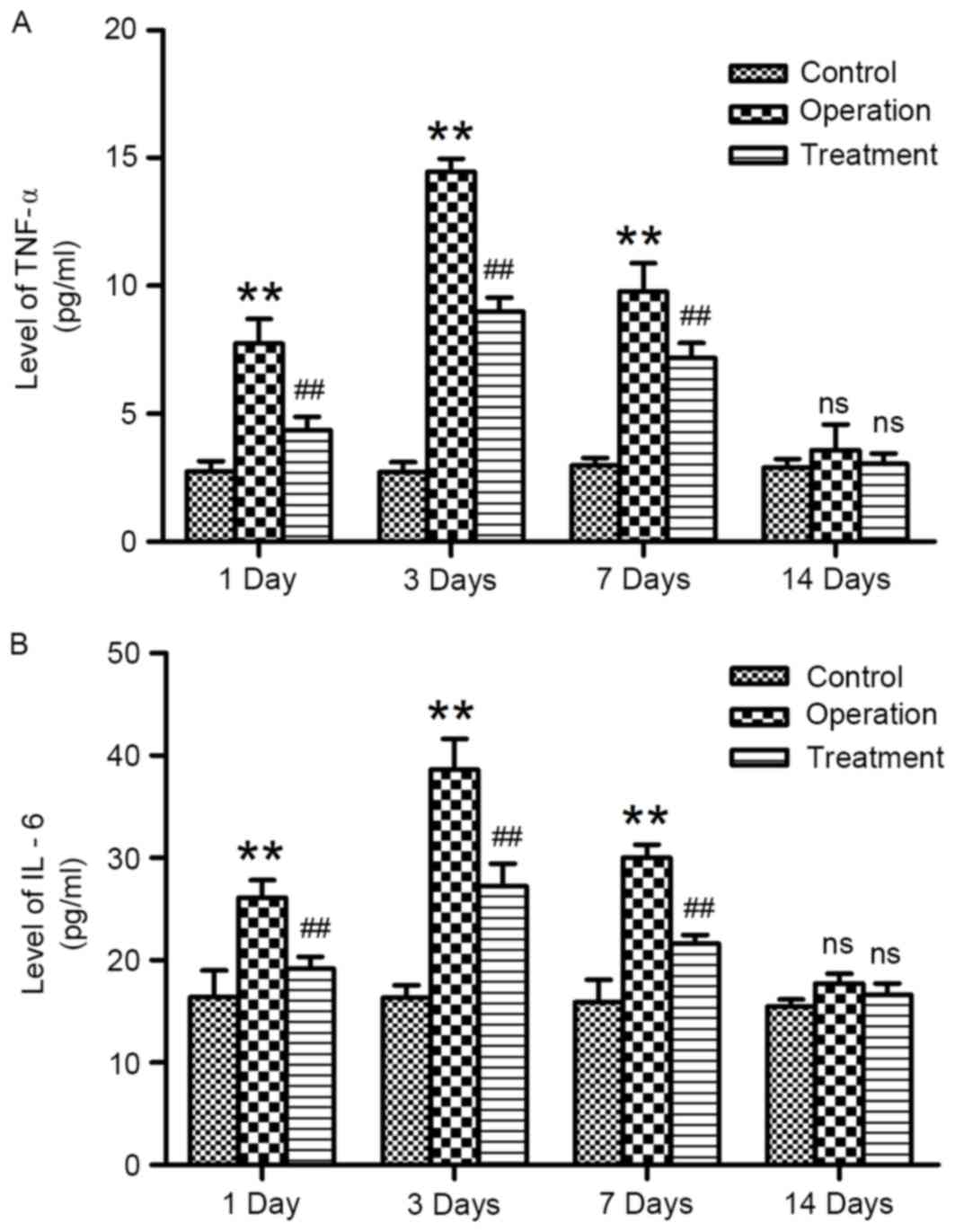|
1
|
Jia Q, Liu LP and Wang YJ: Stroke in
China. Clin Exp Pharmacol Physiol. 37:259–264. 2010. View Article : Google Scholar : PubMed/NCBI
|
|
2
|
Kim HJ, Kim SK, Park HJ, Chung JH, Chun J,
Yun DH and Kim YO: Polymorphisms of IGFI contribute to the
development of ischemic stroke. Exp Ther Med. 3:93–98. 2012.
View Article : Google Scholar : PubMed/NCBI
|
|
3
|
Chaturvedi S, Bruno A, Feasby T, Holloway
R, Benavente O, Cohen SN, Cote R, Hess D, Saver J, Spence JD, et
al: Carotid endarterectomy-an evidence-based review: Report of the
therepeutics and technology assessment subcommittee of the american
academy of neurology. Neurology. 65:794–801. 2005. View Article : Google Scholar : PubMed/NCBI
|
|
4
|
Matter CM, Ma L, von Lukowicz T, Meier P,
Lohmann C, Zhang D, Kilic U, Hofmann E, Ha SW, Hersberger M, et al:
Increased balloon-induced inflammation, proliferation, and
neointima formation in apolipoprotein E (ApoE) knockout mice.
Stroke. 37:2625–2632. 2006. View Article : Google Scholar : PubMed/NCBI
|
|
5
|
Arguizan C, Tringuart L, Touboul PJ, Long
A, Feasson S, Terriat B, Gobin-Metteil MP, Guidolin B, Cohen S and
Mas JL: EVA-3S Investigators: Restenosis is more frequent after
carotid stenting than after endarterectomy: The EVA-3S study.
Stroke. 42:1015–1020. 2011. View Article : Google Scholar : PubMed/NCBI
|
|
6
|
Matter CM, Chadjichristos CE, Meier P, von
Lukowicz T, Lohmann C, Schuler PK, Zhang D, Odermatt B, Hofmann E,
Brunner T, et al: Role of endogenous Fas (CD95/Apo-1) ligand in
balloon-induced apoptosis, inflammation, and neointima formation.
Circulation. 113:1879–1887. 2006. View Article : Google Scholar : PubMed/NCBI
|
|
7
|
Chaturvedi S, Bruno A, Feasby T, Holloway
R, Benavente O, Cohen SN, Cote R, Hess D, Saver J, Spence JD, et
al: Carotid endarterectomy-an evidence-based review: Report of the
therepeutics and technology assessment subcommittee of the american
academy of neurology. Neurology. 65:794–801. 2005. View Article : Google Scholar : PubMed/NCBI
|
|
8
|
Hay C, Micko C, Prescott MF, Liau G,
Robinson K and De Leon H: Differential cell cycle progression
patterns of infiltrating leukocytes and resident cells after
balloon injury of the rat carotid artery. Arterioscler Thromb Vasc
Biol. 21:1948–1954. 2001. View Article : Google Scholar : PubMed/NCBI
|
|
9
|
Li YT, Swales KE, Thomas GJ, Warner TD and
Bishop-Bailey D: Farnesoid X receptor ligands inhibit vascular
smooth muscle cell inflammation and migration. Arterioscler Thromb
Vasc Biol. 27:2606–2611. 2007. View Article : Google Scholar : PubMed/NCBI
|
|
10
|
De Simone V, Franzè E, Ronchetti G,
Colantoni A, Fantini MC, Di Fusco D, Sica GS, Sileri P, MacDonald
TT, Pallone F, et al: Th17-type cytokines, IL-6 and TNF-α
synergistically activate STAT3 and NF-κB to promote colorectal
cancer cell growth. Oncogene. 34:3493–3503. 2015. View Article : Google Scholar : PubMed/NCBI
|
|
11
|
Couffinhal T, Duplàa C, Labat L, Lamaziere
JM, Moreau C, Printseva O and Bonnet J: Tumor necrosis factor-alpha
stimulates ICAM-1 expression in human vascular smooth muscle cells.
Arterioscler Thromb. 13:407–414. 1993. View Article : Google Scholar : PubMed/NCBI
|
|
12
|
Selzman CH, Shames BD, Reznikov LL, Miller
SA, Meng X, Barton HA, Werman A, Harken AH, Dinarello CA and
Banerjee A: Liposomal delivery of purified inhibitory-kappBalpha
inhibits tumor necrosis factor-alpha-induced human vascular smooth
muscle proliferation. Circ Res. 84:867–875. 1999. View Article : Google Scholar : PubMed/NCBI
|
|
13
|
Nurmi A, Lindsberg PJ, Koistinaho M, Zhang
W, Juettler E, Karjalainen-Lindsberg ML, Weih F, Frank N,
Schwaninger M and Koistinaho J: Nuclear factor-kappaB contributes
to infarction after permanent focal ischemia. Stroke. 35:987–991.
2004. View Article : Google Scholar : PubMed/NCBI
|
|
14
|
Williams AJ, Hale SL, Moffett JR, Dave JR,
Elliott PJ, Adams J and Tortella FC: Delayed treatment with MLN519
reduces infarction and associated neurologic deficit caused by
focal ischemic brain injury in rats via antiinflammatory mechanisms
involving nuclear factor-kappaB activation, gliosis, and leukocyte
infiltration. J Cereb Blood Flow Metab. 23:75–87. 2003. View Article : Google Scholar : PubMed/NCBI
|
|
15
|
Ross G, Jiang Y, Landberg G, Nielsen NH,
Zhang P and Lee MY: Determination of the epitope of an inhibitory
antibody to proliferating cell nuclear antigen. Exp Cell Res.
226:208–213. 1996. View Article : Google Scholar : PubMed/NCBI
|
|
16
|
Morikawa E, Zhang SM, Seko Y, Toyoda T and
Kirino T: Treatment of focal cerebral ischemia with synthetic
oligopeptide corresponding to lectin domain of selectin. Stroke.
27:951–955. 1996. View Article : Google Scholar : PubMed/NCBI
|
|
17
|
National Research Council (US) Committee
for the Update of the Guide for the Care and Use of Laboratory
Animals: Guide for the Care and Use of Laboratory Animals. 8th.
Washington (DC): National Academies Press (US); 2011
|
|
18
|
Chen G, Shi JX, Hang CH, Xie W, Liu J and
Liu X: Inhibitory effect on cerebral inflammatory agents that
accompany traumatic brain injury in a rat model: A potential
neuroprotective mechanism of recombinant human erythropoietin
(rhEPO). Neurosci Lett. 425:177–182. 2007. View Article : Google Scholar : PubMed/NCBI
|
|
19
|
Livak KJ and Schmittgen TD: Analysis of
relative gene expression data using real-time quantitative PCR and
the 2(-Delta Delta C(T)) Method. Methods. 25:402–408. 2001.
View Article : Google Scholar : PubMed/NCBI
|
|
20
|
Bassiouny HS, White S, Glagov S, Choi E,
Giddens DP and Zarins CK: Anastomotic intimal hyperplasia:
Mechanical injury or flow induced. J Vasc Surg. 15:708–716. 1992.
View Article : Google Scholar : PubMed/NCBI
|
|
21
|
Austin GE, Ratliff NB, Hollman J, Tabei S
and Phillips DF: Intimal proliferation of smooth muscle cells as an
explanation for recurrent coronary artery stenosis after
percutaneous transluminal coronary angioplasty. J Am Coll Cardiol.
6:369–375. 1985. View Article : Google Scholar : PubMed/NCBI
|
|
22
|
Hong YJ, Jeong MH, Song SJ, Sim DS, Kim
JH, Lim KS, Hachinohe D, Ahmed K, Hwang SH, Lee MG, et al: Effects
of ramiprilat-coated stents on neointimal hyperplasia,
inflammation, and arterial healing in a porcine coronary restenosis
model. Korean Circ J. 41:535–541. 2011. View Article : Google Scholar : PubMed/NCBI
|
|
23
|
Zhou XC, Huang RC, Zhang B, Yin D, Liang
B, Wang SP, Guan QG, Sun XZ, Miao ZL, He XZ, et al: Inflammation
inhibitory effects of sirolimus and paclitaxel-eluting stents on
interleukin-1β-induced coronary artery in-stent restenosis in pigs.
Chin Med J (Engl). 123:2405–2409. 2010.PubMed/NCBI
|
|
24
|
Warner SJ and Libby P: Human vascular
smooth muscle cells. Target for and source of tumor necrosis
factor. J Immunol. 142:100–109. 1989.PubMed/NCBI
|
|
25
|
Kranzhöfer R, Schmidt J, Pfeiffer CA, Hagl
S, Libby P and Kübler W: Angiotensin induces inflammatory
activation of human vascular smooth muscle cells. Arterioscler
Thromb Vasc Biol. 19:1623–1629. 1999. View Article : Google Scholar : PubMed/NCBI
|
|
26
|
Sekiguchi K, Li X, Coker M, Flesch M,
Barger PM, Sivasubramanian N and Mann DL: Cross-regulation between
the renin-angiotensin system and inflammatory mediators in cardiac
hypertrophy and failure. Cardiovasc Res. 63:433–442. 2004.
View Article : Google Scholar : PubMed/NCBI
|
|
27
|
Hinz M, Krappmann D, Eichten A, Heder A,
Scheidereit C and Strauss M: NF-kappaB function in growth control:
Regulation of cyclin D1 expression and G0/G1-to-S-phase transition.
Mol Cell Biol. 19:2690–2698. 1999. View Article : Google Scholar : PubMed/NCBI
|
|
28
|
Ramana KV, Chandra D, Srivastava S,
Bhatnagar A, Aggarwal BB and Srivastava SK: Aldose reductase
mediates mitogenic signaling in vascular smooth muscle cells. J
Biol Chem. 277:32063–32070. 2002. View Article : Google Scholar : PubMed/NCBI
|
|
29
|
Shimizu N, Azuma N, Nishikawa T, Hirata S,
Morishita R, Kaneda Y and Sasajima T: Effect on vein graft intimal
hyperplasia of nuclear factor-kB decoy transfection using the
second generation of HVJ vector. J Cardiovasc Surg (Torino).
48:463–470. 2007.PubMed/NCBI
|
|
30
|
Miyake T, Aoki M, Shiraya S, Tanemoto K,
Ogihara T, Kaneda Y and Morishita R: Inhibitory effects of NFkappaB
decoy oligodeoxynucleotides on neointimal hyperplasia in a rabbit
vein graft model. J Mol Cell Cardiol. 41:431–440. 2006. View Article : Google Scholar : PubMed/NCBI
|
|
31
|
Gareus R, Kotsaki E, Xanthoulea S, van der
Made I, Gijbels MJ, Kardakaris R, Polykratis A, Kollias G, de
Winther MP and Pasparakis M: Endothelial cell-specific NF-kappaB
inhibition protects mice from atherosclerosis. Cell Metab.
8:372–383. 2008. View Article : Google Scholar : PubMed/NCBI
|




















